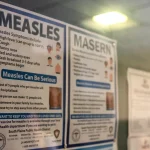MOSCOW: After a string of coordinated attacks on churches, synagogues, and police over the weekend left at least twenty people dead in the southern Dagestan region of Russia, the Kremlin on Monday allayed fears that the historically restive North Caucasus region of the country could experience a wave of unrest.
The attacks on Sunday occurred barely three months after the bloodiest attack on Russia in nearly 20 years, in which fighters from the extremist Islamic State (IS) group massacred over 140 people in a Moscow concert hall.
On Monday, Moscow announced that it had completed a “anti-terrorist operation” and eliminated five of the attackers responsible for the attacks in the cities of Derbent and Makhachkala.
Although there were similarities between the occurrences and the rebel violence that occurred in the North Caucasus in the 1990s and 2000s, the Kremlin on Monday downplayed concerns about a fresh wave of attacks.
Governor describes attacks as an attempt to “destabilize” the area; health ministry reports that some of the 26 injured are critically ill.
The provincial health ministry of Dagestan reported that the attacks claimed the lives of at least 20 persons and injured another 26.
Law enforcement officials made up fifteen of the dead, the Russian Federal Investigative Committee said.
“Five individuals who were involved in the crime were eliminated during the process of suppressing the illegal activities,” the Investigative Committee stated.
The number of participants in the assaults was unknown, and detectives stated they were still trying to “identify other persons involved.”
The terrorists had targeted Derbent, a historic city on the Caspian Sea coast, and Makhachkala, the regional capital, as well as two Orthodox churches, two synagogues, and a police post.
When asked if they anticipated seeing this kind of violence again, Dmitry Peskov, a spokesman for the Kremlin, replied, “No.” Russia is now a separate country. Russia and Dagestan have unified societies, and neither country’s society condones such acts of terrorism.”
The governor of Dagestan, Sergei Melikov, described the attacks as an attempt to “destabilize” his territory, while the Investigative Committee of Russia announced that criminal investigations had been opened into “acts of terror.”
“We know who is behind these terrorist attacks and what goal they are pursuing,” he continued, mentioning the situation in Ukraine but omitting any further information.
“We have to realize that conflict also affects our homes. We sensed it, but we have to deal with it now,” he said, stressing that law enforcement was looking for “sleeper networks” that had helped the attackers get training from overseas.








